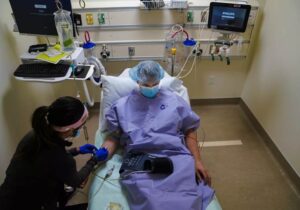Have you ever stopped a doctor from ordering and performing medical tests and procedures that may be a repeat test, nice to know but not critical, or perhaps even unrelated to your issue or concern? If so, how did that go for you?
I’ve discovered I’m not good at saying ‘NO’. I worry about the consequences: Will my care get compromised? Will I get labelled as a ‘difficult’ patient? Perhaps even denied care? However, data indicates unnecessary testing only drives up costs for healthcare which are already high and out of control. Kaiser Health News estimates the costs of unnecessary medical tests and procedures at $200 Billion.¹ Such data suggests there may be value in asking questions and becoming a better advocate for my own care and treatment.
Test Now, Ask Questions Later
Two years ago, I made an appointment with a podiatrist because I was having foot pain, specifically, heel pain. Before ever seeing the doctor, the technician asked me to stand on a platform and two separate x-rays ($88 each) were taken of my foot. By the time the doctor walked into the exam room, based on my description of the pain to the technician, she was ready with a diagnosis. I had Plantar Fasciitis, a condition that occurs when the ligament, that stretches from the heel to the toe, begins to pull away from the heel and becomes inflamed.
X-rays provide images of bones, they don’t provide a view of ligaments and tendons. In some cases, Plantar Fasciitis can produce a heel spur. Heel spurs though rarely cause pain and wouldn’t change the recommended initial course of treatment. Perhaps my physician used the x-rays to ‘rule out’ other diagnoses, but I’m confident the doctor knew my diagnosis even before the first x-ray was taken. As it said in the literature sent home with me after my appointment, “Heel pain is one of the most common conditions podiatrists treat. It accounts for approximately 15 – 20% of our practice.”
Based on her years of experience, this doctor could have arrived at a diagnosis based on a conversation with me about my pain and by manipulating my foot. However, in today’s healthcare system, physicians are financially rewarded for medical tests and procedures conducted in their offices. A fee-for-service healthcare system, benefits the practice while also driving up healthcare costs. This is a horrific waste of time, money, and resources.
Wait a Minute, Why Did You Ask For My Previous Records?
More recently I accompanied my husband to the eye doctor. He was following up with a specialist due to an unusual speck in his eye discovered during a routine eye examination. When setting up the appointment, my husband was asked to have his records forwarded to the specialist’s office, which was in the same building as the original optometrist. The records were all relatively new, certainly within the past month.
However, at the specialist’s office, the technicians proceeded to conduct the same tests as the first doctor (eye charts, dilation of the eyes) rather than building on information already collected and moving directly to the tests to aid with diagnosis and recommendation. By repeating these tests, the office is able to bill insurance, which pads the monetary return to the specialist.
In the ongoing debate on the future of healthcare there’s a lot of binary discussion – ‘medicare for all’ vs. a private/public option. The main focus for these debates is on access, which is important, but access to a broken system is rather problematic. Medical testing is intrusive taking time away from patients as well as exposing patients to additional tests and procedures which in the end might not actually be necessary. It is not a harmless practice.
The Importance of Patients Asking the Questions
In her book, An American Sickness: How Healthcare Became Big Business and How You Can Take It Back, Elisabeth Rosenthal outlines reasons for the high cost of healthcare. According to Rosenthal, insurance companies, hospitals, physicians, and pharmaceutical companies – all share in the blame for rising costs. As she states in the introduction: “These days our treatment follows not scientific guidelines, but the logic of commerce in an imperfect and poorly regulated market, whose big players spend more time on lobbying than defense contractors. Financial incentives to order more and do more – to default to the most expensive treatment for whatever ails you – drive much of our healthcare.”²
Much needs to be changed in the delivery of healthcare in the United States today. But, as Rosenthal asserts, the current situation demands that consumers must be active participants in their own healthcare. As patients, this would suggest we need to begin to ask questions about tests and procedures during a physician or hospital visit. Questions might include: What is the reason for this particular test/procedure? What is the cost? How does this fit with the reason for my visit?
As patients, we have an opportunity to change how medicine is currently practiced. I am more willing to ask questions knowing how critical it is for me to be an active member of my own care team. I hope this article will give you some courage as well. Let me know how it goes.
²Elisabeth Rosenthal, An American Sickness: How Healthcare Became Big Business and How You Can Take It Back (New York: Penguin Books, 2018), p. 5



